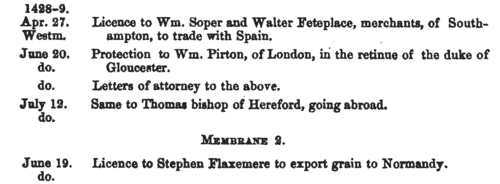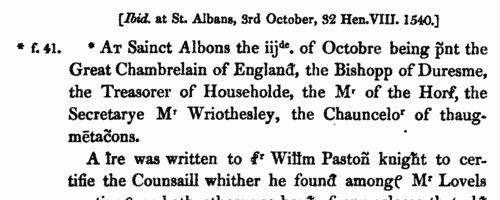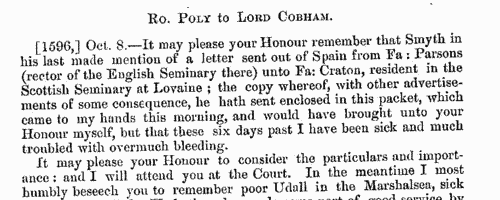Tilley Surname Ancestry ResultsOur indexes 1000-1999 include entries for the spelling 'tilley'. In the period you have requested, we have the following 484 records (displaying 1 to 10): Single Surname Subscription | | | Buying all 484 results of this search individually would cost £2,876.00. But you can have free access to all 484 records for a year, to view, to save and print, for £100. Save £2,776.00. More... |
These sample scans are from the original record. You will get scans of the full pages or articles where the surname you searched for has been found. Your web browser may prevent the sample windows from opening; in this case please change your browser settings to allow pop-up windows from this site. The English in France
(1452)
King Henry VI of England (one of the grandsons of Charles VI of France) claimed the throne of France (and quartered the fleurs-de-lis of France with the lions of England on the royal standard) as had his predecessors since Edward III, as descendants of Philip IV of France. The English had real power or influence in Brittany, Normandy, Flanders and Gascony, and actual possession of several coastal garrisons, in particular Calais, where the French inhabitants had been replaced by English. Henry VI came to the throne only seven years after his father had trounced the French at Agincourt; but his cousin, Charles VII, who became king of France in the same year, spent his long reign rebutting the English king's claim to his throne by territorial reconquest and consolidation. The English administration kept a series of records called the French Rolls. On these are recorded royal appointments and commissions in France; letters of protection and safe-conduct to soldiers, merchants, diplomats and pilgrims travelling to France from England and returning, and to foreign legations. There are also licences to merchants to export to the Continent, and to captains to transport pilgrims. As Henry VI's reign progressed, and the English grip on northern France loosened, the French Rolls also increasingly include entries concerning the ransoming of English prisoners.TILLEY. Cost: £6.00.  | Sample scan, click to enlarge

| Liegemen and traitors, diplomats and spies
(1540-1542)
The Privy Council of England dealt with many delicate and important matters of state. The surviving records date back as early as the 14th century, but Henry VIII on 10 August 1540, with the advice of the council, ordered that the council should have its own clerk 'to write, entre and registre all such decrees, determinacons, lettres and other such things as he shuld be appoynted to entre in a booke, to remayne alwayes as a leger, aswell for the dischardge of the sayd counsaillours touching such things as they shuld passe from tyme to tyme, as alsoo for a memoriall unto theim of their owne procedings'. The register from that date to 8 April 1542 was transcribed for the Commissioners of the Public Records by sir Harris Nicolas, and published in 1837. Although the council often dealt with petitions from aggrieved subjects, its main function was to oversee internal and external security.TILLEY. Cost: £4.00.  | Sample scan, click to enlarge

| Secretary of State's Papers
(1596)
The letters and papers of sir Robert Cecil, Secretary of State, deal with all manner of government business in England, Ireland and abroad.TILLEY. Cost: £4.00.  | Sample scan, click to enlarge

| London Marriage Allegations
(1521-1610)
London, Essex and part of Hertfordshire lay within the diocese of London. In the later 17th century the individual archdeaconry courts issued marriage licences, but for this period the only surviving material is from the overarching London Consistory court. The main series of marriage allegations from the consistory court starts 7 December 1597, and these were extracted by Colonel Joseph Lemuel Chester; Colonel Chester then discovered earlier material, back to 5 January 1521, in Vicar-General's Books of the Principal Probate Registry. The notices in these books were much briefer, but as well as extending back so much earlier, they included additional material for 1597 onwards. All this he collated with the consistory court extracts, and the text was edited by George J. Armytage and published by the Harleian Society in 1887. A typical later entry will give date; name, address and occupation of groom; name, address and condition of his intended bride, and/or, where she is a spinster, her father's name, address and occupation. Lastly we have the name of the church where the wedding was going to take place; or the words Gen. Lic. signifying a general or open licence.TILLEY. Cost: £4.00.  | Sample scan, click to enlarge

| Worcestershire Quarter Sessions
(1620)
J W Willis Bund compiled this abstract of surviving records from the Worcestershire quarter session rolls for the Records and Charities Committee of the Worcestershire County Council. This text, extending as far as 1621, was published in 1899: the entries are arranged by year under the headings Recognizances, Indictments, and Miscellaneous. TILLEY. Cost: £4.00.  | Sample scan, click to enlarge

| Official Papers
(1648)
The State Papers Domestic cover all manner of business relating to Britain, Ireland and the colonies, conducted in the Committee of Both Houses held at Derby House, as well as other miscellaneous records. These records are from January 1648 to January 1649.
TILLEY. Cost: £4.00.  | Sample scan, click to enlarge

| London Marriage Allegations
(1611-1660)
London, Essex and part of Hertfordshire lay within the diocese of London. In the later 17th century the individual archdeaconry courts issued marriage licences, but for this period the only surviving material is from the overarching London Consistory court. The main series of marriage allegations from the consistory court was extracted by Colonel Joseph Lemuel Chester, and the text was edited by George J. Armytage and published by the Harleian Society in 1887. A typical later entry will give date; name, address and occupation of groom; name, address and condition of his intended bride, and/or, where she is a spinster, her father's name, address and occupation. Lastly we have the name of the church where the wedding was going to take place. For the later years Colonel Chester merely picked out items that he thought were of interest, and his selections continue as late as 1828, but the bulk of the licences abstracted here are from the 17th century.TILLEY. Cost: £4.00.  | Sample scan, click to enlarge

| Surrey Sessions
(1659-1661)
Surrey Sessions Rolls and Order Books. These are abstracts of sessional orders, minutes of criminal cases, memoranda and other entries of record taken from the Order Books from Midsummer 1659 to Midsummer 1661, inclusive, and the Sessions Rolls for Easter and Midsummer 1661.TILLEY. Cost: £4.00.  | Sample scan, click to enlarge

| Surrey Sessions
(1661-1663)
Surrey Sessions Rolls and Order Books. These are abstracts of sessional orders, minutes of criminal cases, memoranda and other entries of record taken from the Order Books from October 1661 to January 1663, inclusive, and the Sessions Rolls for October 1661, January 1662, April 1662, July 1662, October 1662 and January 1663.TILLEY. Cost: £4.00.  | Sample scan, click to enlarge

| Allegations for marriages in southern England
(1679-1687)
The province or archbishopric of Canterbury covered all England and Wales except for the northern counties in the four dioceses of the archbishopric of York (York, Durham, Chester and Carlisle). Marriage licences were generally issued by the local dioceses, but above them was the jurisdiction of the archbishop, exercised through his vicar-general. Where the prospective bride and groom were from different dioceses it would be expected that they obtain a licence from the archbishop; in practice, the archbishop residing at Lambeth, and the actual offices of the province being in London, which was itself split into myriad ecclesiastical jurisdictions, and spilled into adjoining dioceses, this facility was particularly resorted to by couples from London and the home counties, although there are quite a few entries referring to parties from further afield. The abstracts of the allegations given here usually state name, address (street in London, or parish), age, and condition of bride and groom; and sometimes the name, address and occupation of the friend or relative filing the occupation. Where parental consent was necessary, a mother's or father's name may be given. The ages shown should be treated with caution; ages above 21 tended to be reduced, doubtless for cosmetic reasons; ages under 21 tended to be increased, particularly to avoid requiring parental consent; a simple statement 'aged 21' may merely mean 'of full age' and indicate any age from 21 upwards. These are merely allegations to obtain licences; although nearly all will have resulted in the issuing of the licence, many licences did not then result in marriage. TILLEY. Cost: £4.00.  | Sample scan, click to enlarge

|
Research your ancestry, family history, genealogy and one-name study by direct access to original records and archives indexed by surname.
|












